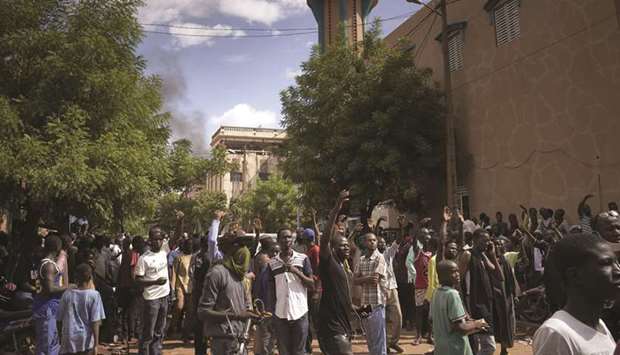A Malian protest leader yesterday called for calm after four more people were killed in escalating demonstrations demanding President Ibrahim Boubacar Keita’s resignation, in the West African country’s worst civil unrest in years.
The capital Bamako was rocked by bloody demonstrations on Friday and Saturday, with witnesses saying that security forces fired live rounds during clashes with protesters.
Attempting to calm the increasingly insurgent atmosphere in Bamako, Keita announced he would dissolve the poor Sahel country’s constitutional court.
The court has been at the centre of controversy since it overturned provisional results for parliamentary elections earlier this year, triggering protests in several cities that on Friday descended into violence in which at least three were killed.
Clashes raged again in Bamako on Saturday as demonstrators — angered by a long-running insurgency, economic woes and perceived government corruption — insisted Keita step down.
Four civilians — including a 15-year-old and 17-year-old — were killed overnight Saturday, a hospital official told AFP on condition of anonymity.
Six opposition figures were detained in recent days, of whom one was released late Saturday, as the government cracks down on an alliance known as the June 5 Movement, which is channelling deep-seated frustrations across the country.
The leading figure of the opposition movement, influential imam Mahmoud Dicko, tried to tamp down the tensions yesterday.
“I once again call on the youth of Mali to show restraint and calm,” Dicko told AFP shortly before speaking at a funeral for three of those killed in Bamako.
“We can truly find and obtain what we want (through) patience (and) good behaviour,” he said. “But the struggle continues.”
In a video broadcast earlier on social media, Dicko urged: “Do not set fire to petrol stations or this district. Calm down, please! Calm down!”
He had recorded the video at his mosque, the scene of especially violent clashes at the weekend.
While the known death toll is currently seven, Dicko’s supporters have said the total is much higher, broadcasting videos resembling scenes of war.
In the videos, at least two dead men can be seen in pools of blood, while others have bullet wounds. Shots can be heard at regular intervals from such a distance that the shooters cannot be identified.
“You are killing Malians in the mosque with live ammunition. The mosque is on fire,” said a man in one the videos, which could not be independently verified.
Yesterday, hundreds crowded around Dicko’s mosque, walking over spent bullet shells, rubble and the remains of torched tires.
Opposition leaders who have not yet been arrested now appear to be in hiding.
Fearing that Dicko will be arrested like other movement leaders, his supporters yesterday erected barricades “in case the police return”, one of them said.
Clashes have also been reported outside the home of the constitutional court’s president Manassa Danioko, who has become a figure of public anger.
Following a long-delayed parliamentary poll in March — which Keita’s party won — the court overturned the provisional results for about 30 seats, a move that saw several members of Keita’s party elected and is widely viewed as having ignited the crisis.
The 75-year-old president, in power since 2013, had said on Saturday he had revoked the nominations of all remaining members of the constitutional court so that new judges could be appointed from next week.
Since the parliamentary election stirred outrage, a disparate group of religious leaders, political and civil society members have banded together to ramp up pressure on Keita.
This movement headed by Dicko, which says it is peaceful and those in power are responsible for violence, has called for “civil disobedience”, which includes the non-payment of fines and blocking entry to state buildings.
This level of violence is rare in Bamako, which has been spared much of the unrest that is routine across swathes of Mali.
The former French colony has struggled to contain an insurgency that first emerged in the north in 2012 before spreading to the centre of the country and to neighbouring Burkina Faso and Niger.
Thousands of soldiers and civilians have been killed and hundreds of thousands of people have been forced from their homes.

Protesters gather in front of the Salam mosque of Badalabougou in Bamako yesterday.
